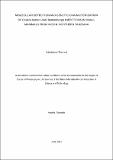| dc.description.abstract | Zoonotic pathogens, including Coxiella burnetii and Bartonella species, are known causes of
febrile illness globally; however, knowledge on their animal hosts is still limited in many
countries including Tanzania. This study aimed to: 1) determine the presence and prevalence
of C. burnetii and Bartonella spp in small mammal; 2) identify risk factors for C. burnetii and
Bartonella infection in small mammals; and 3) characterize the Bartonella genotypes present
in small mammals and their fleas. Spleen samples were tested for the presence of C. burnetii
(n=382) and Bartonella spp (n=381) DNA. Overall, 12 (3.1%) of 382 (95% CI: 1.6-5.4)
spleens from small mammal tested were positive for C. burnetii DNA. Coxiella burnetii
DNA was detected in five (71.4%) of seven (95% CI: 29.0-96.3) small mammal species;
Rattus rattus (n=7), Mus musculus (n=1), Acomys wilsoni (n=2), Paraxerus flavovottis (n=1)
and Atelerix albiventris (n=1). Eleven (91.7%) of twelve (95% CI: 61.5-99.8) C. burnetii
DNA positive were trapped within Moshi Urban District. Overall, 57 (15.0%) of 381 (95%
CI: 11.3-18.5) small mammal spleens tested positive for Bartonella DNA. Bartonella DNA
was detected in three species (R. rattus n = 54, M. natalensis n = 2 and P. flavovottis n = 1)
using qPCR targeting the ssrA gene. Analysis of R. rattus species only for risk of Bartonella
infection indicated that Bartonella infection was more likely in reproductively mature as
compared to immature small mammal (OR = 3.42, p<0.001). Multiple Bartonella genotypes
closely related to known zoonotic Bartonella species were identified in the tested small
mammals and fleas. These findings demonstrate that small mammal in Moshi, are hosts of C.
burnetii and Bartonella spp and may act as a source of these pathogens to humans and
animals. Further studies covering broad range of potential hosts should be considered in order
to understand the distribution of these pathogens in other animals. Efforts are needed to
determine the clinical impact of C. burnetii and Bartonella infection in humans. Further
studies are needed to fully characterize the prevalence, genotypes and diversity of Bartonella
spp and C. burnetii in different host populations and their potential impacts on human health. | en_US |

